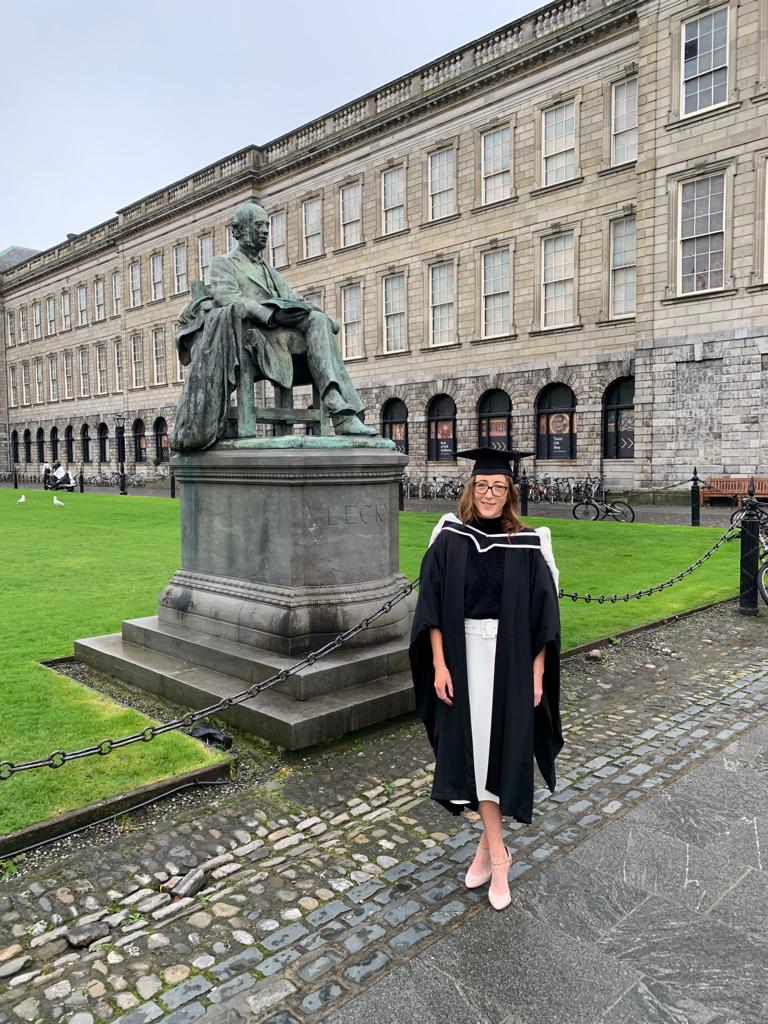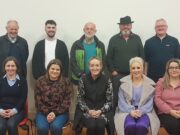A single individual can have a far-reaching impact on a child’s academic performance, according to the lead researcher in a new study from Trinity College Dublin (TCD,) Jillian Sheehan who lives in Wolfhill.
The study, carried out by Jillian in conjunction with Dr Kristin Hadfield from the School of Psychology, TCD, focused on the academic resilience of children from low income backgrounds, particularly in maths.
It found that multiple factors impact a child’s academic performance including a child’s belief in their own academic ability and parental educational expectations for the child.
Lower levels of parent-child conflict and greater parental education also emerged as key predictors of better maths performance. “Many factors influencing academic resilience for children experiencing poverty are bidirectional and, therefore, complex,” said Jillian.
“Personally, I feel it is as important to help children develop an interest and passion for learning so that school and learning are enjoyable and rewarding experiences, and parents, teachers, and educators all have a role to play in this,” she remarked.
The research which was recently published in the British Journal of Developmental Psychology, drew on data from 1,715 children and their caregivers, taking part in the Growing Up in Ireland longitudinal study, spanning almost 20 years.
Success in school can be a young person’s main avenue to break the cycle of disadvantage, observed Dr Hadfield.
“By understanding the diverse factors that shape academic resilience, we can develop targeted interventions to empower young people from low income background and enhance their educational outcomes.”
Jillian said that coming from the northside of Cork city, the research resonated with her.
“The harsh reality is that academic achievement within our current educational framework is influenced by factors far beyond a child’s internal characteristics.
“Our research underpins the pivotal role of parents, teachers, educators, researchers and policymakers in the pursuit of educational equity in this country.”
In Jillian’s case, her mother was a major influence. “Neither of my parents completed the Leaving Cert, but my mother was an avid reader and keenly interested in education. She was determined that my siblings and I would get the opportunity to attend university.
“I loved reading from a very young age and would get completely lost and absorbed in fiction and non-fiction. This significantly impacted my ability to excel in school as I just loved learning, and I still do,” she said.
“I attended what is now a Deis school, and in my mind as a child, the school was the same as any other. I think, indeed, at primary school level anyway, I believed all academic success was purely down to how smart I was and how hard I could work.
“If someone didn’t do well, I was naive enough to think it was purely 100 per cent related to how academically smart someone was.
“And to be honest, this is often still the way we speak about people, in terms of them being ‘brainy’ if they do well and perhaps not so much if they don’t. This ‘brainy’ or ‘not’ label can significantly impact students’ self-esteem and motivation,” Jillian said.
At second level, she said, she began to understand the significant impact of income on ability to succeed within the current educational framework.
“Poverty is associated with numerous disadvantages that can put children at significant risk of academic failure.
“These children often begin lagging in performance, and these gaps tend to persist. Additionally, they are less likely to complete second level education and attend third level education.”
Looking at children living in poverty who excelled at school, Jillian and her colleague did a deep dive into the factors within their environment that contributed to academic resilience that could be influenced or changed such as internal characteristics, family dynamics, school environment and community support.
In her own case, Jillian said she probably struggled with confidence more than anything. “I was lucky that, in addition to my mother’s influence, I encountered several educators, teachers, and mentors who believed in me more than I believed in myself. They helped me reach my school potential and made me realise the impact that one adult can have on a child.”
In sixth year, she was awarded student of the year and achieved the highest Leaving Cert results in her school, including an A1 in honours maths, a significant achievement for that school at that time.
She went on to do an engineering degree at University College Cork (UCC), where she said she had some of the best years of her life.

She was awarded the title of academic scholar in her first year and got a scholarship to study engineering at UMASS, Amherst, Massachusetts, in third year.
“While there, I had the opportunity to study health science and psychology in addition to my engineering modules.
“This experience sparked a realisation that I wanted to make a more direct impact on people’s lives, leading me to transition from engineering to a health-related field.
“Additionally I was struggling with my own physical health, having lived with chronic disease – Type One diabetes – from the age of 12, and I was keen to explore all and any factors that could enhance my physical health and physical resilience,” Jillian said.
After working as a health professional for many years and gaining qualifications in exercise and health studies, yoga, and personal training, she felt there was a gap in her ability to help people achieve their health goals.
“I also became fascinated by all forms of resilience, how some people can overcome adversity or setbacks by maintaining adequate functioning, bouncing back or even thriving.
“This realisation led me to pursue a psychology degree as a mature student, a decision I made with determination and commitment.
“I chose Trinity College specifically because their psychology programme heavily focused on statistics, another passion, and neuroscience, which appealed to me.”
During the final year of her undergraduate degree at Trinity, she chose resilience as her research topic.
“I was very fortunate to have Dr. Kristin Hadfield as my supervisor. She does incredible work focusing on how young people’s resilience, wellbeing and mental health can best be promoted.”
Jillian graduated with first class honours and was awarded three academic awards, two for her final year research thesis while also securing the Trinity College graduates’ prize in psychology.
The introduction of the Deis programme has made a significant difference in the lives and learning experiences of many children across this nation, Jillian said.
“Even the provision of hot meals can make a vital difference in the daily lives of children experiencing poverty.
“I feel they truly are doing tremendous work to address the educational needs of children and adolescents from disadvantaged communities.
“However, when we look at the data, the income achievement gap has not significantly reduced and there continues to be considerable scope for improvement.
“This might be related to the amount of money that people from middle and high income families can spend to provide their children with an academic advantage. Nobody is to blame here.
“This is simply the reality of the world we live in, where money provides access to resources that would otherwise be out of reach,” she contended.
“However, it’s important to remember that individuals, not just systems, can make a significant difference.
“I believe that individuals have much more power and influence than they realise, and in my experience, one adult can have a far-reaching impact on a child,” said Jillian.
“Our research discovered that parental expectations for their child were significantly associated with academic performance, in addition to the child’s belief in their academic ability.
“Previous research has also demonstrated that teachers’ expectations can influence children’s performance. This emphasises the hope we can have in the potential of individuals to positively impact a child’s academic journey.”
So many factors impact success at school, particularly for children living in poverty, according to Jillian.
“Belief in their intellectual ability is merely one factor among many. Academic resilience is dynamic and multi systemic and can be influenced by many factors at multiple levels of the child’s environment.
“I see many teachers and parents going to extreme lengths to help all children do well at school, and there is certainly a greater emphasis on third level education being accessible to all.”
Progress has been made in recent decades, Jillian contended.
“We have made higher education more accessible. For example, the Trinity Access Programme has allowed many students to gain entry into Trinity, providing opportunities for those who might not have otherwise been able to pursue studies there.
“Many other universities have similar programmes, and it is inspiring to see such concerted efforts to promote educational equity,” she said.
“As parents, we play a crucial role in nurturing our children’s love for reading and learning. Our influence is significant, and we can set high expectations for them, providing unwavering support and guidance, regardless of the paths they choose in life.”
She and her husband, former Laois footballer, Noel Garvan, have one daughter, Kaia, who attends Ballyadams National School.
“It’s an excellent school with a strong emphasis on inclusivity and kindness.
“The teachers are also incredibly passionate about nurturing a love for learning in the children. Kaia loves the school, and we feel fortunate to have it close to our home.”
Jillian and Noel met in Dublin while she was working and living in the capital.
“It was around the time when Laois was doing well in football. I can honestly say I had barely heard of Laois, let alone Laois footballers.
“We still share a laugh about it today, as it was pretty amusing to me to see those guys being treated like mini celebrities back in their home county.
“Although, after living with Noel for the past 15 years in Laois, his passion for the GAA has rubbed off on me. I am now a big fan.
“Our daughter, Kaia, plays underage, and Noel and I have both been involved in underage development in our local club.
“Through the years, I have gotten to see how the GAA is a fantastic community-based resource for all children to get involved in, emphasising inclusion in sports.
“It is also a wonderful way for blow-ins like myself to meet people and become involved in the community.”

Jillian and Noel and have been running a health centre and injury clinic for over a decade.
“We recently built a purpose-built facility where we live. We run Garvan Injury and Performance and Cuimsiu Health from there.
“Noel is mainly involved in treating injuries and improving mobility with the goal of injury prevention and joint health, while I run the gym and do one-on-one personal training to help people achieve their health goals.
“We also develop corporate programmes for physical resilience and run seminars and workshops,’ said Jillian.
“I feel truly blessed to love what I do, and this love fuels my passion and enthusiasm.
“I will always continue to work with individuals and groups, helping people achieve their health goals and improve their quality of life.
“My time at Trinity has given me a second passion, research, specifically resilience in children and adolescents. So, I do not doubt I will continue to work in this capacity.”
Looking to the future, Jillian said she firmly believes that the voices of children and young adolescents living in poverty must be heard.
“I would love to see a shift towards person-centred research, where the research is heavily focused on listening to the authentic voices of whom the research is about and actively involving them in the research process to design interventions that can significantly improve academic resilience for children experiencing poverty.”
Jillian’s paper is available to read here.
SEE ALSO – ‘Mindless vandalism’ caused at hallowed place of worship in Portlaoise


























